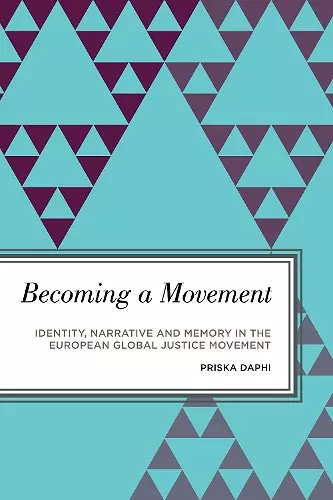Becoming a Movement
Identity, Narrative and Memory in the European Global Justice Movement
Format:Hardback
Publisher:Bloomsbury Publishing PLC
Published:4th Aug '17
Currently unavailable, and unfortunately no date known when it will be back
This hardback is available in another edition too:
- Paperback£41.99(9781786603807)

Social movement scholars have become increasingly interested in the role of stories in contentious politics. Stories may facilitate the mobilization of activists and strengthen the resonance of their claims within public discourse and institutional politics. This open access book explores the role of narratives in building collective identity – a vital element in activists’ continued commitment. While often claimed important, the connection between narratives and movement identity remains understudied. Drawing on a rich pool of original data, the book’s analysis focusses on the Global Justice Movement (GJM), a movement known for its diversity of political perspectives. Based on a comparison of different national constellations of the GJM in Europe, the book demonstrates the centrality of activists’ narratives in forming and maintaining movement identity and in making the GJM more enduring.
The ebook editions of this book are available open access under a CC BY-NC-ND 4.0 licence on bloomsburycollections.com. Open access was funded by Goethe University Frankfurt am Main
In this deeply researched and compellingly theorized book, Priska Daphi shows that becoming part of a movement is learning to tell the movement’s story. Daphi demonstrates how the Global Justice Movement was able to forge solidarity across strikingly different national contexts by recounting the movement’s own history. Synthesizing theories of collective identity, narrative and group memory, Becoming a Movement contributes powerfully to our understanding of the cultural dimensions of mobilization. -- Francesca Polletta, Professor of Sociology, University of California, Irvine
Priska Daphi shows how narratives help define activists’ realities. Her engaging book offers a deep understanding of identity construction by comparing movement stories in several national contexts. This thoughtful analysis provides penetrating insights into a core movement mechanism: Collective Identity Construction. This book is a groundbreaking study that will be welcomed by all engaged researchers pondering the role of narratives, identity and the cultural realities of activism. -- Hank Johnston, Professor of Sociology and Hansen Chair of Peace Studies, San Diego State University
In this important contribution to the literature, Priska Daphi draws on original and rich cross-national data to explore the relationship between memory, narratives and collective identity in one of the most influential movements of recent years, the Global Justice Movement. Full of nuanced insights on collective meaning making and narratives of becoming and belonging, Becoming a Movement is a compelling read. -- Cristina Flesher Fominaya, Reader in Social Politics and Media, Loughborough University; Editor-in-Chief of Social Movement Studies, UK
Comparing activists’ narratives across countries, movement sectors and time this book provides a persuasive answer to how heterogeneous socio-cultural backgrounds and political traditions have been bridged in the Global Justice Movement. Filling a gap in social movement studies, Daphi’s excellent research reveals how cognitive, relational and emotional components of narratives shape processes of collective identity formation. -- Lorenzo Mosca, Associate Professor of Political Science, Scuola Normale Superiore, Florence
Daphi’s volume makes an important empirical contribution to a more complex understanding of the role of narrative in the formation and maintenance of movement identity, which is interesting beyond social movement and narrative studies. * Journal Of Intervention and Statebuilding *
Becoming a Movement is an important and innovative contribution to the
field of social movement studies. An indispensable book for the scholars of movement
identity and the GJM alike.
The book is particularly strong in revealing how cognitive, relational and emotional factors came together in the formation of a powerful movement narrative that had the ability of constructing a collective identity even though the activists did not share the same political perspectives. Daphi concludes by arguing that movement narratives are particularly successful if they combine the idea of shared experience with a plurality of diverse perspectives uniting in common agency. Overall, her book very successfully underlines the importance of memories for social movements. * Moving the Social: Journal of Social History and the History of Social Movements *
ISBN: 9781786603791
Dimensions: 239mm x 158mm x 19mm
Weight: 426g
164 pages